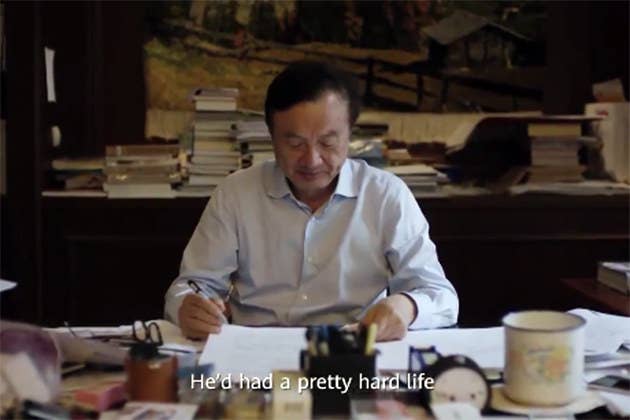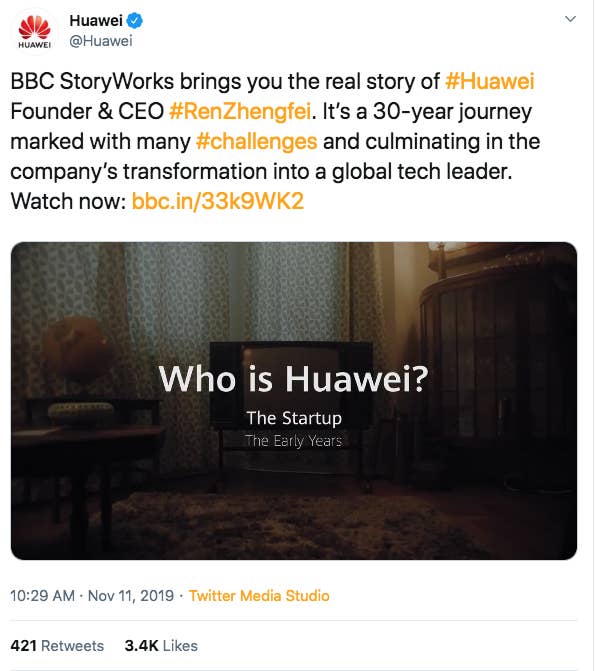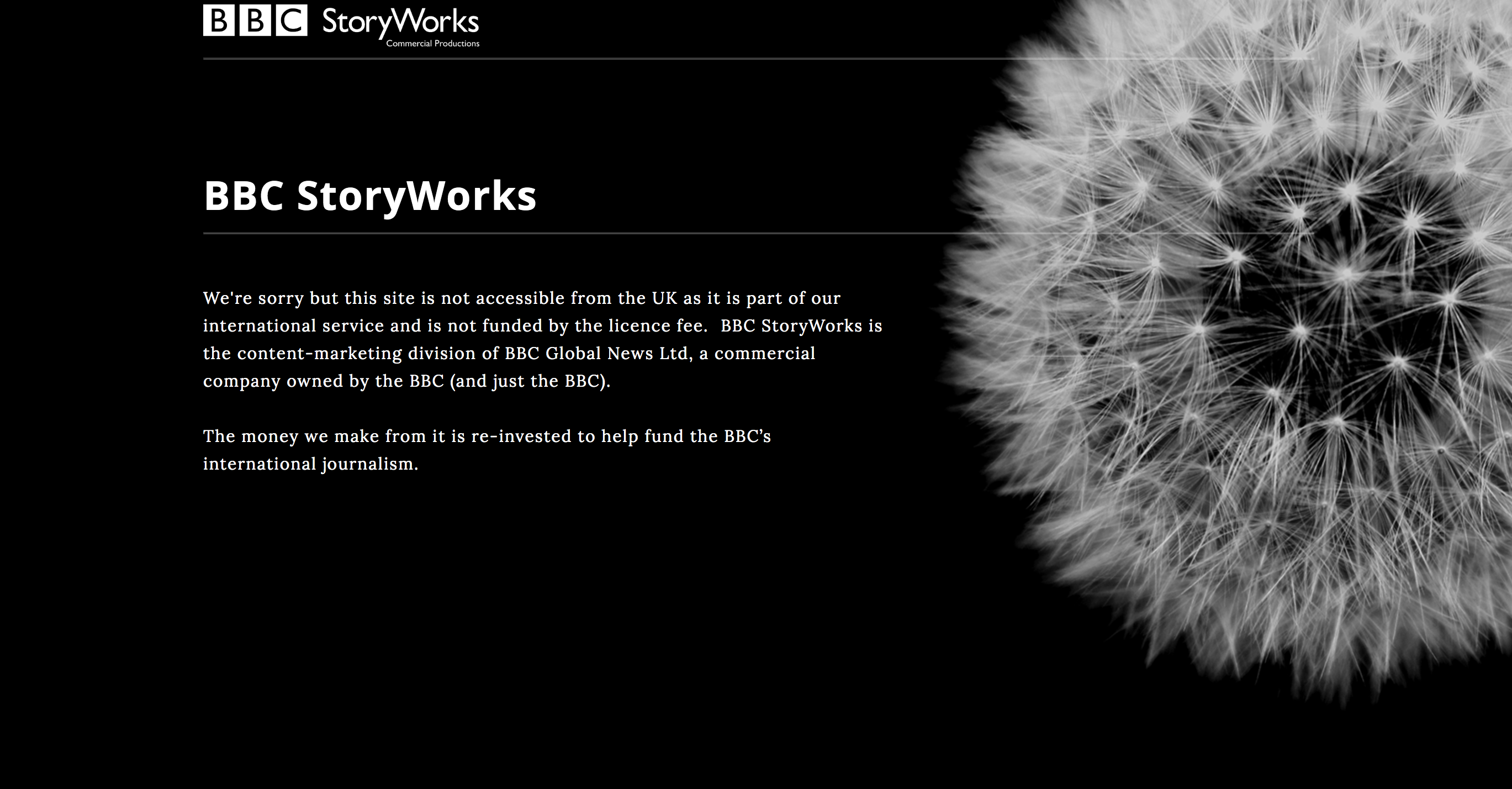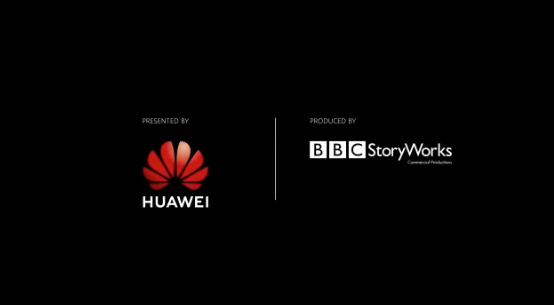
BBC News reporters have expressed strong dismay after the UK public broadcaster’s in-house commercial team posted sponsored content it produced for Huawei, the controversial Chinese telecommunications giant.
Videos and a stand-alone website WhoIsHuawei.com to promote the “real story” of the company have been made by the BBC’s sponsored content team, StoryWorks. The new BBC campaign was announced in July this year in what the company admitted at the time was an effort to rebrand Huawei and "prevent misinformation".
This week, Huawei and BBC StoryWorks began posting the content to Twitter, Facebook, and YouTube, beginning with a five-minute video introducing the company.

The description from Huawei read: “BBC StoryWorks brings you the real story of #Huawei Founder & CEO #RenZhengfei. It’s a 30-year journey marked with many #challenges and culminating in the company’s transformation into a global tech leader.”
The same message was shared on Huawei’s YouTube channel, and the company also bought advertising on Twitter to ensure the video found its way into the timelines of Twitter users.
The video shows a series of people delivering gushing testimonials about Huawei and the company’s CEO, Ren Zhengfei, backed by what sounds like Hans Zimmer’s score from the 2010 film Inception.
It ends with a call to visit WhoIsHuawei.com and the Huawei logo alongside the BBC’s StoryWorks logo against a black background.
The WhoIsHuawei.com link redirects to a site at BBC.com, which is geo-blocked to UK IP addresses.
UK visitors to the website are instead shown a spinning dandelion and the message: “We're sorry but this site is not accessible from the UK as it is part of our international service and is not funded by the licence fee. BBC StoryWorks is the content-marketing division of BBC Global News Ltd, a commercial company owned by the BBC (and just the BBC).”

Behind the geo-block, visitors could read more glowing, uncritical, BBC-branded content about Huawei.
“What brave new paths will Huawei carve out next?” the website reads. “To hear the next exclusive chapter of the Huawei story, visit us again in a week!”
@Huawei It's not BBC, but you who brings the "real" story. Nothing's real when you even lie here about it.
Sources familiar with the arrangement said neither the BBC News business unit nor the China reporting team were consulted about how the commercial tie-in may affect the coverage of China or Huawei in the future.
A senior BBC journalist told BuzzFeed News the broadcaster should be ashamed of the video: “It’s pretty shocking and embarrassing that this has been published under the BBC’s name.
“Management will definitely be getting the message that we think this undermines genuine reporting on Huawei, a company with serious questions to answer.”
After seeing the video, one BBC journalist immediately replied, “I nearly threw up.”
Another source said the video and website not only cast a shadow over the broadcaster’s reputation for impartiality but showed how bad actors could abuse the BBC’s global brand and trusted reporting.
“Why would Huawei bother answering questions from BBC reporters, or giving a sit-down interview, when they can just do this instead?” they asked.

These types of sponsored content deals between media brands and companies are not new; BuzzFeed, for example, produced a small amount of content for Huawei in 2014. But some will question the wisdom of the BBC — which gets the bulk of its funding from UK taxpayers and is one of the world’s most trusted public broadcasters — in doing a deal like this with a controversial company with ties to the Chinese government.
The BBC–Huawei sponsored content deal comes as the UK government is being pressured by the United States to ban Huawei from providing parts of the infrastructure for the UK’s 5G network over security fears.
Meanwhile, BBC News reporters are actively covering the brutal crackdown by Hong Kong riot police on pro-democracy protesters, as well as China’s repression and internment of an estimated 1.5 million Muslim Uighurs in Xinjiang.
When BuzzFeed News approached the BBC on Tuesday night with a series of questions, including about whether the BBC’s brand was being used to whitewash Huawei’s corporate image, a spokesperson replied: “The BBC maintains clear separation between its commercial and editorial departments, and BBC News continues to report rigorously, impartially and without fear or favour on all issues, with no consideration of wider commercial relationships.”
But by Wednesday morning, Huawei had deleted the tweet that proudly trumpeted “the real story” of the company as told by BBC StoryWorks.
It reposted the video on Twitter with no mention of the BBC; on YouTube, the description was also changed without any clarification.
The BBC wouldn’t comment on whether it had contacted Huawei to get it to scrub the news outlet's involvement in the tweet and YouTube description.
BuzzFeed News has also put questions to Huawei, including whether Adam Mynott, the company’s vice president of communications in Europe and a former BBC News correspondent, played any role in negotiating the deal.
